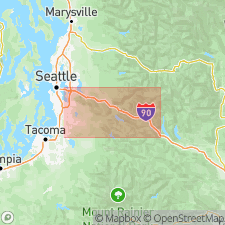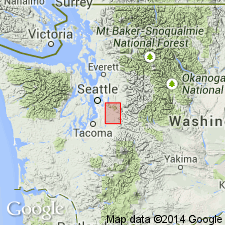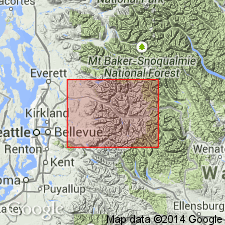
- Usage in publication:
-
- Tukwila Formation*
- Modifications:
-
- Areal extent
- Reference
- Biostratigraphic dating
- Dominant lithology:
-
- Coal
- Tuff
- Breccia
- AAPG geologic province:
-
- Puget Sound province
Summary:
Described in Tiger Mountain-Taylor Mountain area in central King Co, WA about 15 mi east of "type area". Taylor Mountain area has more complete exposures of unit than is exposed in "type area". Reference section given in secs.22,27 and 34 T23N R7E. Represents 7000-ft-thick lens of volcanic material entirely enclosed within coal-bearing sedimentary rocks of Puget Group. Beds of sandstone, siltstone, and coal typical of group overlie, underlie, and are interstratified with andesitic rocks of Tukwila. Subdivided locally on basis of gross lithology and texture. Tuff, fine-grained volcanic sandstone, and volcanic tuff-breccia characterize lower members that are interstratified with Tiger Mountain Formation (new) of Puget Group. Contact with overlying Renton Formation is sharp but probably regionally time-transgressive. Plant fossils determined by Jack Wolfe to represent late Eocene.
Source: GNU records (USGS DDS-6; Menlo GNULEX).

- Usage in publication:
-
- Tukwila Formation*
- Modifications:
-
- Named
- Biostratigraphic dating
- Dominant lithology:
-
- Sandstone
- Siltstone
- Shale
- Arkose
- AAPG geologic province:
-
- Puget Sound province
Summary:
Named for city of Tukwila in western King Co as formation in Puget Group. [No type]. Exposed in secs.11 and 14 T23N R4E, Des Moines 7.5' quad. Estimated thickness is 2500 ft. Base is not exposed; may be fault. Most of unit in lowermost 1750 ft consists of volcanic sandstone, siltstone, and shale. Middle unit of arkosic rocks (250 ft thick), is lithologically similar to rocks of Renton Formation (new) of Puget Group. Uppermost unit consists of volcanic sedimentary rocks and is less than 500 ft thick. Conformably underlies Renton Formation. Plant fossils from upper part, considered by R.W. Brown to represent "later half of the Eocene".
Source: GNU records (USGS DDS-6; Menlo GNULEX).

- Usage in publication:
-
- Tukwila Formation*
- Modifications:
-
- Geochronologic dating
- AAPG geologic province:
-
- Puget Sound province
Summary:
Andesite breccia from upper part of formation near Newcastle about 6 mi northeast of type area [Tukwilla] yielded zircon fission-track age of 41.3 +/-2.3 Ma and composite hornblende K-Ar age of 42.0 +/-2.4 Ma. Age considered to be late middle and late Eocene.
Source: GNU records (USGS DDS-6; Menlo GNULEX).

- Usage in publication:
-
- Tukwila Formation*
Summary:
Not compiled to date. Publication available online: http://ngmdb.usgs.gov/Prodesc/proddesc_10042.htm
Tukwila Formation of Puget Group. Age is late and middle Eocene.
Source: Publication.
For more information, please contact Nancy Stamm, Geologic Names Committee Secretary.
Asterisk (*) indicates published by U.S. Geological Survey authors.
"No current usage" (†) implies that a name has been abandoned or has fallen into disuse. Former usage and, if known, replacement name given in parentheses ( ).
Slash (/) indicates name conflicts with nomenclatural guidelines (CSN, 1933; ACSN, 1961, 1970; NACSN, 1983, 2005, 2021). May be explained within brackets ([ ]).

